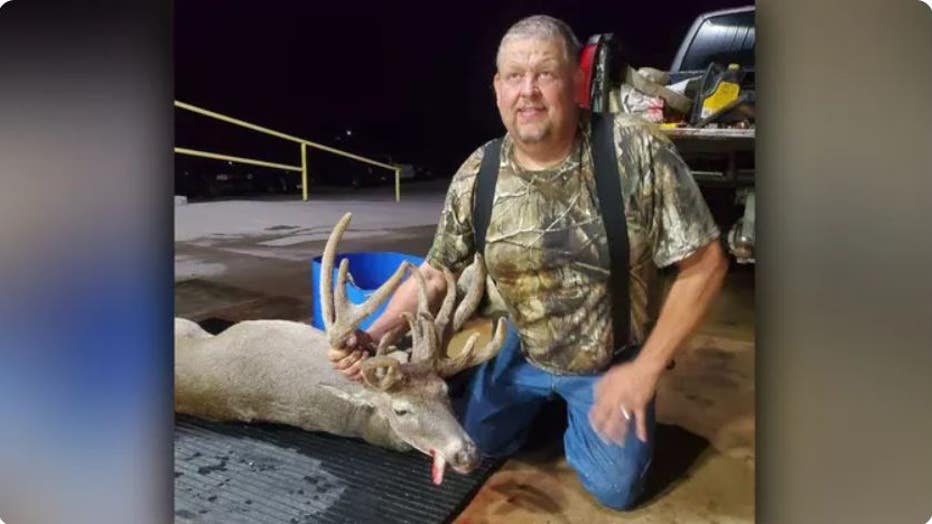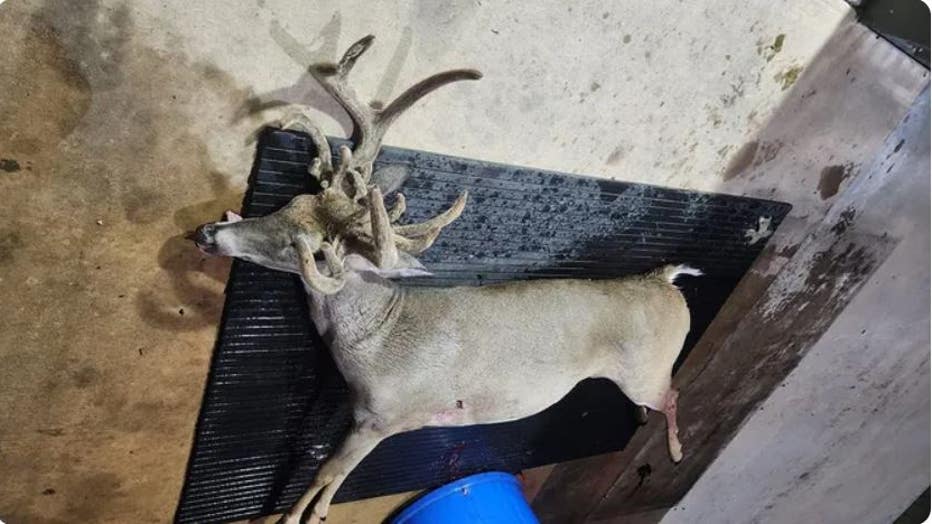18-point doe stuns Missouri bow hunter after he bags possible record-setting deer
Bow hunter Kelly Moore of Shell Knob, Missouri shot an 18-point antlered doe in Barry County after waiting more than three hours in 80-degree weather. (Johna Moore)
Kelly Moore waited his entire life for this unique opportunity to harvest a potentially world record that walked in front of his southwest Missouri deer blind.
The non-sport hunter shot an 18-point antlered doe Tuesday with a crossbow in Barry County after waiting for more than three hours in 80-degree weather.
"I really didn't expect ever to see a deer of that caliber come to me stinking like a fat pig in that blind," he said with a laugh while recalling his first outing of the season.
Quite a few other deer passed by Moore that evening, some as large as eight-point, but he decided he would wait until a bigger one showed up.
DEADHEAD BUCK SETS NEW STATE RECORD IN MINNESOTA
'I'm not going to shoot anything unless it's special'
Born in Kansas City and raised in Cassville, Moore has lived in Shell Knob for more than 20 years and has been hunting since he was big enough to walk in the woods with his parents.
"I went with them at first, but when I was 8 years old, my dad had me reloading my own shells," Moore said. "It's been a lifelong hobby for me."
That outdoor interest reached its pinnacle for Moore after seeing the massive deer on his trail camera a week before coming eye-to-eye with the doe. She managed to stay elusive until Moor's phone notified him of activity the morning of the hunt.
"I never go out that early because of the heat and how fast you have to be on top of recovering and processing it because it'll spoil so much faster," said Moore, adding that he usually waits until the leaves fall, and it's cold. However, this deer prompted him to go out early.
The archery deer hunting season runs from Sept. 15-Jan. 15, except for the November portion of the firearms deer hunting season.
"I told myself when I went out there that I'm not going to shoot anything unless it's special because of the heat of the day," Moore recalled.
Moore has a variety of places he likes to hunt, but he has always returned to the same location for years.
"I have other places I go, but this is my No. 1 spot that I usually use, and it's been consistent over the last few years of me getting a nice rack out of it," Moore said.
SEE IT: DEER FINDS MOST UNUSUAL MAMMAL-EATING FRIEND TO SWIM WITH OFF WASHINGTON COAST

Wildlife officials have reported an overpopulation of deer, making it rare to see an antlered doe of any size with only a 1-in-10,000 chance of occurrence. (Johna Moore)
1-in-10,000 chance
Moore said he had no clue at the time it was a doe and became quite disappointed when he found out what he had shot. He said he felt like he had taken an elusive buck that had managed to hide from hunters for years – not a freak of nature.
"But after doing some research on it and finding out what it is, … it's just something that had too much testosterone in it," Moore said.
Moore was also surprised to learn that this particular type of doe typically does not shed its antlers or velvet.
"They don't do all the things that a buck does, which may have played a role in why it showed up when it did," he said. "They are extremely elusive, especially when they get to that size."
Moore contacted the Missouri Department of Conservation after hunting the deer for sustenance, not sport. Wildlife officials have reported an overpopulation of deer, making it rare to see an antlered doe of any size with only a 1-in-10,000 chance of occurrence.
"I think we're going to see a lot more of them in the future than we have in recent years, but it's not totally unheard of, but definitely uncommon," Moore said.
CAUGHT ON CAMERA: DEER HAS LUCKY ESCAPE DURING MOUNTAIN LION ATTACK IN CALIFORNIA

Moore said the state can't do an official score on it until the preserving process is complete with the antlers, which requires 60 days. (Johna Moore)
The record doe has already been delivered to a well-known and trustworthy taxidermist in the southwest Missouri area, Moore said.
At this point, Moore said the state can't do an official score on it until the preserving process is complete with the antlers, which requires 60 days.
"It's definitely a record," Moore said. "I don't know that it's going to be No. 1. A friend of mine came over and got a rough score on it of 157 7/8 and believes that it's going to be like the third largest in the world."

